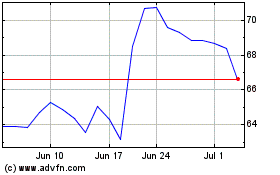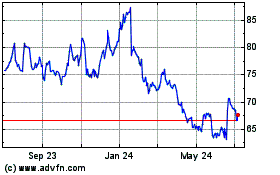By Melanie Evans and Joseph Walker
Limited stock of the first drug shown to treat Covid-19 is
arriving at hospitals, and location is a driving factor in whether
a patient gets any as states, counties and hospitals use different
approaches to allocate their shares.
Gilead Sciences Inc. is ramping up production of the drug,
remdesivir, which moderately sped recovery for hospitalized
patients in a federal study -- though it isn't known whether the
drug can prevent death from the disease, which is caused by the new
coronavirus. The company is donating early supplies to the federal
government in the U.S., which is allocating it to states.
Food and Drug Administration criteria for remdesivir use under
its May 1 emergency authorization are broad, doctors say, and
little published research points to who might benefit most. States
and counties, which are allocating the drug to hospitals, are
devising widely different methods of awarding the scarce supply.
Hospitals, too, use different methods to decide who to treat. That
means a patient who qualifies in one locale might be shut out in
another.
"We're in a situation of scarcity and we have to find a fair way
to allocate this scarce resource," said Doug White, a doctor and
ethicist at the University of Pittsburgh.
Hospitals affiliated with the University of Pittsburgh decide
who gets the drug by lottery -- though not a totally random one. It
is designed to slightly boost chances of patients from economically
distressed neighborhoods. "Random lotteries will simply propagate
disparities," said Dr. White, who helped develop the system.
It will also increase chances for essential workers, such as bus
drivers, agricultural workers and grocery-store clerks, he
said.
West Virginia hospitals will use the drug for patients first
come, first served. UW Medicine in Seattle is requiring anonymous
patient applications, to avoid possible bias.
Decisions about how best to use remdesivir are the latest
example of the health-care system's need to ration critical goods
and services amid the pandemic. To deal with scarcity, health-care
providers typically rely on plans for how to ethically deploy
resources, where the highest priority isn't the welfare of any one
patient but rather the community, said Robert Truog, director of
the Harvard Medical School Center for Bioethics. But maximizing
benefits can conflict with their fair use, he said.
UPMC, the hospital system and health insurer affiliated with the
University of Pittsburgh, doesn't have enough remdesivir for all
patients who qualify for treatment. "Not by a long shot," Dr. White
said.
States took over allocations to specific hospitals after the
Department of Health and Human Services faced criticism for its
initial distribution. HHS will have shipped 80% of Gilead's initial
donation of about 607,000 doses to states by the end of the week,
the agency said.
An HHS spokeswoman said this week that the government expects to
receive more than 330,000 additional doses from Gilead, but the
company declined to confirm any increased donation. "We are
reviewing the incidence of disease and discussing with the U.S.
government the amount of remdesivir potentially needed through the
end of June," Gilead spokesman Chris Ridley said.
In a National Institute of Allergy and Infectious Diseases
study, patients with Covid-19 who were given remdesivir recovered
four days faster than those given a placebo. It is the first drug
to show success in a late-stage clinical trial against the virus,
which has infected more than 1.58 million and killed more than
94,700 in the U.S., data collected by Johns Hopkins University
shows.
That study and another led the FDA to clear the drug for
emergency use for hospitalized patients with low blood-oxygen or
those who either need ventilators to breathe or supplemental oxygen
through a respirator mask or nasal tubes.
That covers virtually all patients admitted to hospitals for
Covid-19, say doctors. Because there isn't enough remdesivir to
treat them all, doctors have called for the National Institutes of
Health, which includes the NIAID, to release detailed study data,
which they say will help to prioritize who should get the drug.
Doctors expect that analyzing granular study data will reveal
patterns showing which variables -- such as symptoms or length of
illness -- predict who will be helped by the drug.
"When you're allocating scarce resources without good
information, it's really dicey," said Rochelle Walensky, chief of
infectious diseases at Massachusetts General Hospital. "We haven't
seen any data; it's been paralyzing."
West Virginia has received approximately 1,160 vials of
remdesivir. It will divide stock equally across four regions of the
state, said Dr. William Ramsey of the West Virginia University
Health Sciences Center, who is chief logistics officer for the
state's pandemic response.
Hospitals in each region will draw from local supply. Patients
qualify for the drug if they meet FDA emergency-use criteria on a
first-come, first-served basis.
California awarded its share by county, based on numbers of
hospitalized Covid-19 patients.
In San Diego County, patients were eligible if they had symptoms
for no more than 10 days or had been on a ventilator for no more
than five, said Ghazala Sharieff, chief medical officer for Scripps
Health. That excluded 18 at Scripps's hospitals who otherwise would
be eligible, Dr. Sharieff said. Doctors identified 14 who met the
county's criteria, while Scripps received doses for five patients,
she said.
The county has changed its formula and will now award doses
based on numbers of each hospitals' Covid-19 patients during the
prior two weeks, Dr. Sharieff said.
A San Diego County spokeswoman said the county switched to
proportional distribution from criteria based on FDA guidance for a
six-dose course of treatment.
Some states have issued guidance that narrowed pools of eligible
patients.
Beaumont Health, which has eight hospitals in Detroit and
Southeast Michigan, received about 400 vials of remdesivir. It
wasn't enough for the roughly 130 Covid-19 patients who met FDA
criteria, said Paul Chittick, section head of infectious disease at
Beaumont Hospital, Royal Oak.
Michigan then issued new guidance calling for hospitals to use
doses for patients with more severe oxygen needs, such as those
with nose tubes or ventilators, Dr. Chittick said. Southfield,
Mich.-based Beaumont has enough drugs for patients who qualify
under the more restrictive criteria, he said.
Michigan's Department of Health and Human Services urged
hospitals to treat severely ill patients and comply with ethical
considerations to treat those who need it most, an agency spokesman
said.
At UW Medicine, doctors fill out an anonymous application for
the drug that includes only medical information needed for criteria
set by the FDA and Washington state to avoid bias, said Shireesha
Dhanireddy, an infectious-disease doctor on the committee that
approves requests.
UW Medicine so far has enough doses, she said, but that may
change with future allotments from the state. "It's not an
unlimited resource," she said.
Write to Melanie Evans at Melanie.Evans@wsj.com and Joseph
Walker at joseph.walker@wsj.com
(END) Dow Jones Newswires
May 22, 2020 10:38 ET (14:38 GMT)
Copyright (c) 2020 Dow Jones & Company, Inc.
Gilead Sciences (NASDAQ:GILD)
Historical Stock Chart
From Mar 2024 to Apr 2024

Gilead Sciences (NASDAQ:GILD)
Historical Stock Chart
From Apr 2023 to Apr 2024
